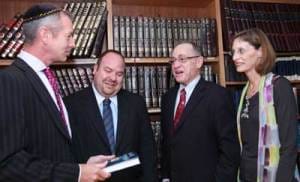Robyn Dixon writes for the LA Times:
The adolescent country. The bit player. The shrimp of the schoolyard.
For Australians it’s not so bad — most of the time — to be so far away, so overlooked, so seemingly insignificant as to almost never factor in major international news. The lifestyle makes up for it.
But occasionally, there’s an awkward, pimply youth moment so embarrassing that it does sting. Like when 19 of the world’s most important leaders visit for a global summit and Prime Minister Tony Abbott opens their retreat Saturday with a whinge (Aussie for whine) about his doomed efforts to get his fellow Australians to pay $7 to see a doctor.
So I surfed over to news.com.au and did not get this impression at all. According to the Robyn Dixon article, what matters for a country’s foreign policy is impressive speeches and meddling in other countries affairs. For me, a foreign policy consists of protecting your borders and seeking your country’s best interests.
I guess American dipolomat Victoria Nuland is the epitome of the big-time foreign player, telling Ukraine who should be in their government. To me, that’s cringe-worthy.
I’ve lived about 12 years of my life in Australia and for most people I knew, Australia was the lucky country.
Look at Dixon’s lead: “The adolescent country. The bit player. The shrimp of the schoolyard.”
Do you think she would write this about a new black country, even one that considerably under-achieved Australia (as all majority black countries do)? She would only feel free to disparage such a country if it were white.
Dixon writes: “The Group of 20 summit could have been Australia’s moment, signaling its arrival as a global player, some here argued. But in all, the summit had Australians cringing more than cheering.”
So if Australia had made a splashy Global Warming treaty and committed its troops in some pointless overseas combat, then it could have arrived as a global player?
As far as the summit having Australians cringing more than cheering, that applies to Australians left of center, not those right of center, who are just fine with what happened (if you read the Australian press).
Dixon writes:
It was a classic example of what Australian author and journalist Peter Hartcher calls the “pathology of parochialism” in a recent book, “The Adolescent Country.” Hartcher argues that the nation’s politicians rarely miss a chance to trump important foreign policy matters of long-term national interest to score cheap domestic political points.
“The big matters are commonly crowded out by the small,” he argues. “International policy is used for domestic point-scoring.”
Who is this Peter Hartcher? He’s apparently a big fan of George W. Bush and Middle East adventurism, writing in 2005:
Until now, US presidents have been content to live with this stronghold of tyranny in the Middle East in the service of stability. This has been one of the manifestations of the school of realism in US foreign policy. George Bush reminded us again yesterday in his State of the Union address that he is no realist. He is an idealist and that means he is a revolutionary.
Last month, in his inaugural address, Bush made a case against tyranny that was so powerful and seemed so brimful with purpose that dictators around the world grew concerned: “We will persistently clarify the choice before every ruler and every nation: the moral choice between oppression, which is always wrong, and freedom, which is eternally right.”
…Hartcher believes that Australian politicians have lately squandered opportunities to strengthen the country’s global position at the time of a major global power shift.
“The great crises that threaten Australia’s national prosperity come from abroad,” he wrote. “So do the grandest opportunities. But the reflex in Australia’s national politics is that where these biggest stakes come into competition with the smallest, the small are the ones that very often win.
“Measured against its potential today and its needs tomorrow, Australia is seriously underperforming and it is underperforming because of the pathology of parochialism.”
Considering how the invasions of Iraq and Afghanistan turned out, I’d say Australia would be better off sticking to its parochial concerns.
Crikey posts: “Hartcher’s article fits into a long line of Australian journalists and politicians taking free, Zionist lobby trips to Israel and miraculously returning with glorious tales of Jewish heroism, Palestinian violence and Zionist democracy. Crikey’s Margaret Simons investigated this tradition in January and revealed a number of participants on the trips failed to disclose the all-expenses paid jaunts (to its credit, the Herald acknowledged Hartcher’s free holiday.)”

